Photo



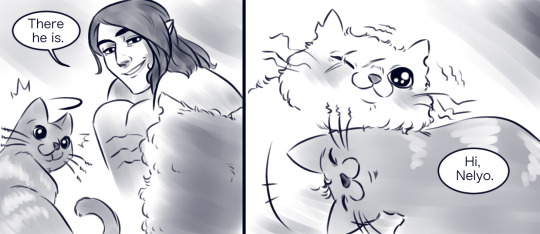
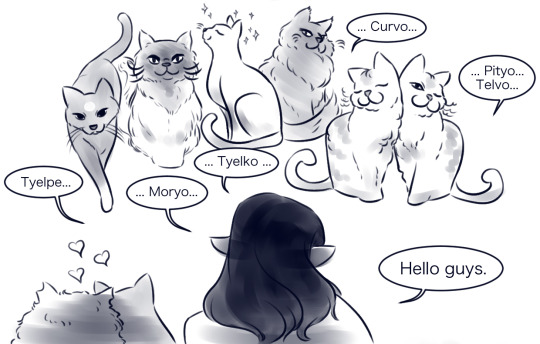

My friends and I quickly agreed that Modern Maglor would be a cat person… then we also agreed that he would stumble upon stray cats and take them in… and name them after his brothers because they remind them of him xD
Finno doesn’t live with Maglor, but he often gets in SOMEHOW to visit Nelyo.
We have expanded this au way too much xD I wish I could share it all with you but then this would become an awfully long post. Some other time maybe.
1K notes
·
View notes
Photo
That’s an excellent point! I should have specified that I meant the Noldor in exile. Finarfin totally took the more official title in Aman, though he had zero influence over the ruling of the Noldor who were in exile.
But Fëanor does still remain the second High King after Finwë (and technically Finarfin follows once everyone goes into exile, ruling the Noldor in Aman).
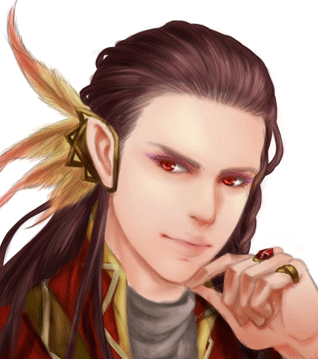
I want to see AU Feanor who became the second high king of Noldor.
#awesome point#fëanor#fingolfin#finarfin#finwë#Noldor family trees#line of succession#tolkien#middle-earth#aman
249 notes
·
View notes
Photo
Uh... But... Fëanor was the second high king of the Noldor. The title went from Finwë to Fëanor, and then Fëanor was killed by Gothmog (he went poof into flames). Upon his death, the crown went to Maedhros, and when Maedhros was captured, it went temporarily to Maglor (poor bastard) for those 30 some odd years.
Now, Fingon rescued Maedhros, so Maedhros took the crown again. But in order to rectify the breach between the families, he passed the crown to Fingolfin, and the crown officially left Féanor’s line.
So... Fëanor was the second High King of the Noldor, and Fingolfin was the fifth. I think a lot of people forget that both Maedhros and Maglor were High King at one point.
I’m not sure exactly what you meant in your post, though. It wouldn’t be AU for Fëanor to be the second High King. ;)
Did you mean an AU with Fingolfin getting the crown before Fëanor so Fëanor would have been second of the sons of Finwë to get the crown? Or like Fëanor survived and reigned as the second High King for... you know... longer than it took him to start a war, burn some ships (and, debatably, one of his sons), and challenge a balrog?

I want to see AU Feanor who became the second high king of Noldor.
249 notes
·
View notes
Photo
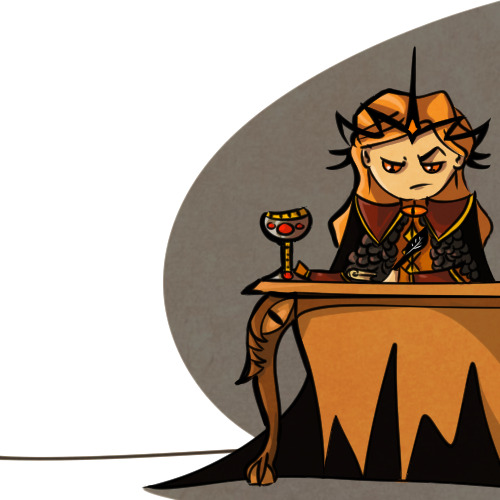

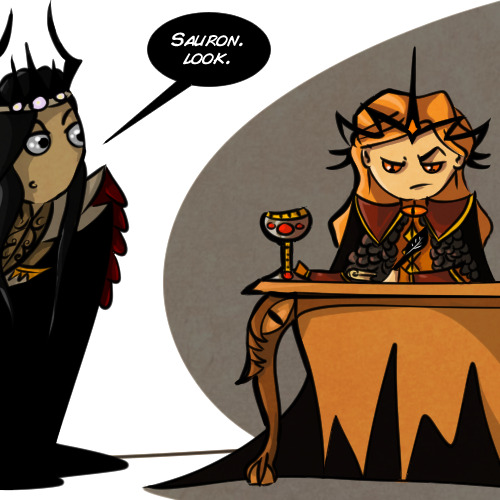

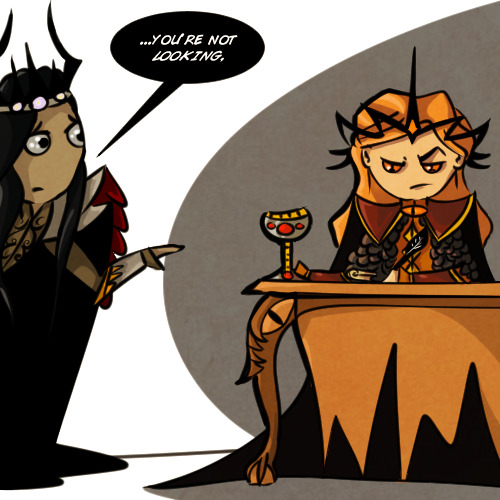

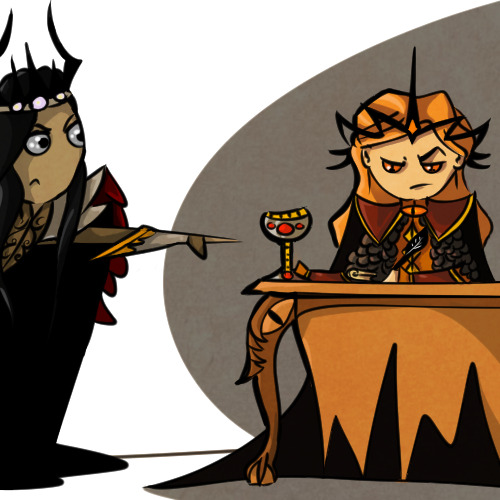
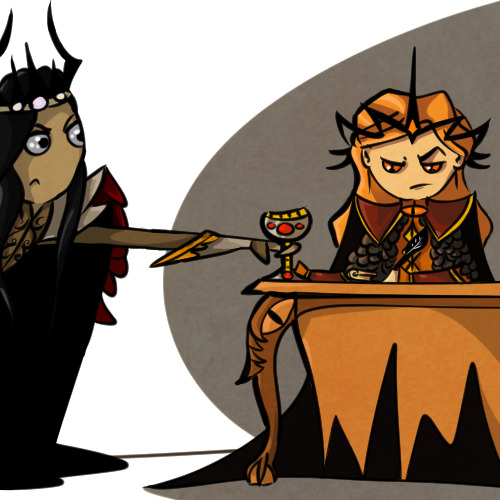


Melkor the Corruptor angry cat
hella long post for ts! I didn’t have the heart to post it all in one line, I couldn’t do that to anyone’s dash. So click through for full effect!
Designs for Melkor and Sauron are 100% from my lifelong inspiration, the incredible melkorwashere.
3K notes
·
View notes
Note
Yes I have a question. I've noticed that in your stories, elves engage in unwanted activities and survive. Why is this? We all know that elves die when raped. I'm not critizing your stories, I am genuinely curious, so please answer this. Are you ignoring it for the sake of writing? Are you in the opion of those who think they only die if already married? Or does it have something to do with them both being male, and so not counting? Or does Sauron have the ability to keep souls from leaving?
Hi Anon,
You ask a valid question, and I’m aware that how I write rape scenarios does rather contradict Tolkien’s canon, so I’ll try and explain my reasoning.
Under the cut for mild discussion of rape / its aftermath.
Read More
45 notes
·
View notes
Photo


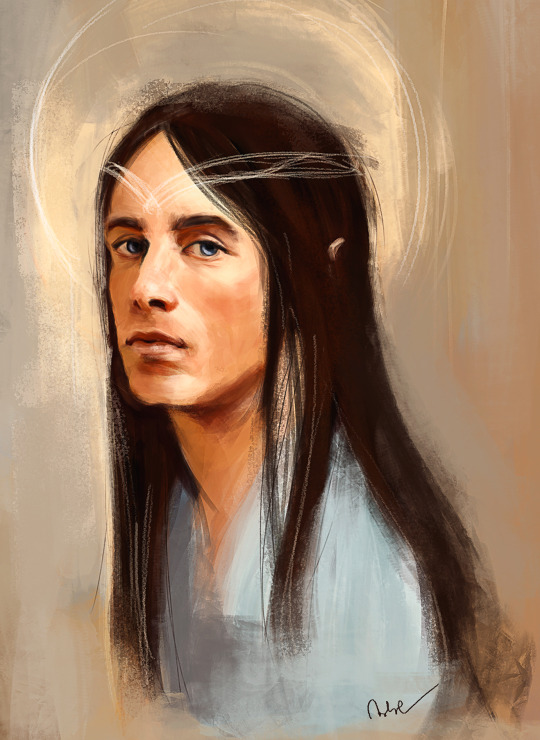


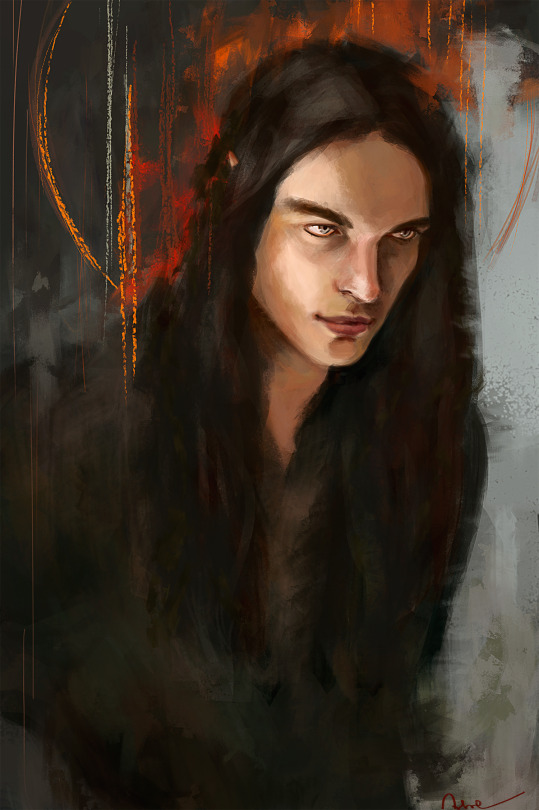

Feanor and his sons master post! <3
They’re all speed paintings done at random times and I might change how I see them in the future… but yeah, I just wanted to post all these babies together <:
4K notes
·
View notes
Text
Sindarin Phrasebook: Part 3
NOTE: Words in BOLD are not attested! These are merely my best guess at deriving words using all the language resources I have at my disposal.
questions
Are you finished? - Trecarach?
Do (you/they) understand (me)? - (Heniach/Heniar) (nin)?
Do I know you? - Iston len?
Do you feel well? - El mae?
Do you speak Elvish? - Pedich Edhellen?
How are (you/you doing) (today)? - Manen (ech/carach) (arad)?
How? - Manen?
Is there trouble here? - Trast sí?
What are you doing? - Man carach?
What did you say? - Man pennich?
What do you want (for it)? - Man anírach (assan)?
What is your name? - Man enneth lín?
Where are (we/you) going? - Mas (trevadim/trevadich)?
Where are (you/we) from? - Mas (etholich/etholim)?
Where are we meeting? - Mas gevedim?
Where did that come from? - Mas te ethol?
Where is the meeting? - Mas i ‘ovaded?
Which one? - Man pen?
Who is leading? - Man toged?
Who is/was that? - Man te?
Will you marry me? - Erthathach enni?
Would you like (drink/food)? - Anírach (sog/aes)?
other phrases
For love, my friend. - Am meleth, mellonen.
Forgive me - Geheno nin
Have you a better idea? - Gerig anmaer naw?
(I)/(I don’t) know - (Iston)/(Aviston)
(I)/(I don’t) want it - (Aníron)/(Avaníron) han
(I/we) am yours to command - (Im/men) lín cauno
I do not need to know this. - Avo bauren isto hen.
I have not seen them in days. - Av’arin tírannen ren ned eraid.
I need to rest - Aníron idho
I see - Tírion
I thank you - Hannon (len/chen)
I thought they would never leave - Nauthannon i avo ‘wannathar ge
I wish to speak - Aníron pedi
If I cannot keep you as my lover, I will keep you as my friend. - Ae avochebin chen be velethronen, hebithon chen be vellonen.
If I fall, I will fall knowing I fought with all my strength to protect the love of my life. - Ae dannon, dannathon istol i maethannen na vellasen ban verio i veleth-e-guilen.
Sleep well. I will keep the demons from you. - Idho mae. Hebithon in roeg o le.
The bodies of our foes will gleam under the sun. - Idh ‘raw-i-chythem tinnatha nu Anor.
What is your point? - Mas i ventech?
dirty phrases
Bend over, my love, do. - Cuno am, melethen, caro.
Bring me (the prisoner/my servant/my lover), naked and bound! - Togo nin (i vandor/vuirenen/velethen), lanc a naud!
By Elbereth, you have a lovely arse. - Ai, Elbereth! Gerich tele velui!
Do you deep-throat? - Cerich nûrlanc?
Do you like swords or shields? - Anirach leng egor thend?
Do you want soft cord, hithlain, or chain tonight? - Anirach nordhvoe, chithlain, egor angwedh fuin hen?
Don’t stop - Avo dharo
Explain again to me the point of this game. - Trenaro ad enni i vent o thelien hen.
Feel me - Matho nin
Harder… harder… Yes! That’s the spot! - Annorn… annorn… Ai, te i had!
Have me - Garo nin
How will that fit in there?! - Manen nestegitha te ennas?!
I want you oiled and begging for me. - Aniron chen, glaeweb a iestol enni
Impressive. - Maeron.
Is that what they call it? - Na te ian estar han?
Make love to me - Echado veleth enni
My friend, this game is awful. - Mellonen, telien hen na taur.
My, my, I see your skills as a warrior are not your only greatness! - Elo, elo… cenin i cyruch be vaethor avo belegasech erui!
Oh heavenly bliss, you are so tight! - Ai gell-e-menel, nach tongwain!
Quick! Hide! My wife is coming! - Lagor! Delio! Bessen tolel!
Shut up and take it like a man! - No dínen a garo be adan!
Such a pretty elfling, I must corrupt him! - Edhelle vain, boe thawad enni!
That will never fit in there - Te avo nestegitha ennas!
Watch the teeth. - Tiro i cherch.
What do you mean you want to be on top? - Man pedech, anirach bo caw?
What!?! You have to be out of your mind; that isn’t elvenly possible! - Man?! Gerich es saemech; te avonautha edhellen!
When was the last time (you made love/you had someone/someone had you)? - Mar i anad vedui i (echannich vel/gernich pen/pen gern chen)?
Where’s that wretched oil? - Mas i ‘lae thrachannen?
Who’s your daddy? - Man i adach?
You 10:00. You 10:30 and bring a friend. - Ech ne phae. Ech ne phervinchaer, a togo vellon.
You have the loveliest arse, darling. - Gerich i dele veluwain, seron vell.
You. My talan. Now. - Ech. Talan nîn. Si.
How flexible are you?
Very flexible!
We’ll see, no? - Manen celeg nach?
Celegwain!
Tíratham, baw?
What’s my name?
What?
Say my name, bitch! - Man enethen?
Man?
Pedo enethen, hûril!
85 notes
·
View notes
Text
Sindarin Phrasebook: Part 2
NOTE: Words in BOLD are not attested! These are merely my best guess at deriving words using all the language resources I have at my disposal.
endearments
Ancient one(s) - Pen iaur (pin ioer)
Bane of my heart - Dagnir-e-guren
Bearded one(s) - Pen fang (pin feng)
Beautiful one(s) - Pen vain (pin vain)
Beloved - Seron vell
Dear one(s) - Pen vuin (pin vuin)
Eager one(s) - Pen vara (pin vere)
Fierce warrior(s) - Maethor veleg (maethyr velig)
Foe of my foe - Coth cothen
Friend of my friend - Mellon mellonen
Friend(s) - Mellon (mellyn)
Guardian(s) - Beriadir (beriedir)
Heart of my heart - gûr-e-gûren
Little bird(s) - Aewithen (aewithin)
Little one(s) - Pen dithen (pin dithin)
Little singer(s) - Linnon dithen (linnyn dithin)
Love - Meleth
Love of my life - Meleth-e-guilen
Lovely one(s) - Pen velui (pin velui)
Lover (f) - Melethril
Lover (m) - Melethron
Loyal one(s) - Pen dolog (pin delyg)
Lustful one(s) - Pen vaelui (pin vaelui)
Mighty one(s) - Pen veleg (pin velig)
My beautiful warrior - Maethoren vain
My child - Hênen
My dark warrior - Maethoren vorn
My friend(s) - Mellonen (mellynen)
My golden warrior - Maethoren valthen
My heart - Gûren
My lady - Hirilen
My lord - Híren
My love - Melethen
My master - Herdiren
My old friend - Mellonen vrûn
My Prince - Ernilen
My Princess - Taurelen
My soul - Faeren
My strength - Bellasen
My warrior - Maethoren
Singing father - Adar linnol
Tall one(s) - Pen dond (pin dynd)
Wise one(s) - Pen hael (pin hael)
Your friend - meldirech(m)
insults
Abominable one(s) - Pen thaur (pin thoer)
Angry one(s) - Pen ruthren (pin rythrin)
Cowardly dog - Hûachaseb
Dark one(s) - Pen vorn (pin vyrn)
Dirty one(s) - Pen ‘waur (Pin ‘woer)
Horrible one(s) - Pen ngortheb (pin ngerthib)
Icy one(s) - Pen chelcheb (pin chelchib)
Impetuous one(s) - Pen ‘orn (pin ‘yrn)
My enemy(-ies) - Cothen (Cythen)
Silent one(s) - Pen dhínen (pin dhínin)
Tormented one(s) - Pen vauleb (pin voelib)
exclamations
Be gone from my sight! - Ego a cheneden!
By the sea and the stars! - An i ‘aer a in elin!
Glorify! - Eglerio!
Go away! - Ego!
Hurry! - Lago!
Hide! - Delio!
I loathe you! - Delion chen!
Listen to my laughter! - Lasto lalaithen!
Look! - Tirio!
Now! - Si!
Oh! - Ai!
Run (for it)! - Noro (assan)!
Stop (that)! - Daro (te)!
That hurts! - Te naegra!
You disgust me! - Fuiach nin!
invitations
This is my home - Sen baren
Come, eat, and drink of the feast - Telo, medo, a sogo uin mereth
Come, join us - Telo, ertho ven
Come near the fire - Telo an úr
You will always be welcome here - Nanithach maetolo sí uireb.
mushiness
I have loved you - Im mellen chen
I love you - Melin chen
I will love you forever - Melithon chen uireb
I will not live without you - Avo guithon uchen
You are all I dreamed - Ech pân i olthannen
greetings
A star shines on the hour of our meeting - Êl síla or lû o govaded vín
Good day - Maer aur
Good night - Maer daw
Greetings - Suilad
I serve you - Buion len
I give greetings (to everyone) - Suilannon (allen)
I have not seen you for a long time - Avgennin anann chen
My heart sings to see you - Gûren linna ceni chen
Well met - Mae govannen
You again? - Chen ad?
farewells
Fair winds - Syl vain
Farewell - Navaer
Good (day/afternoon/evening/night) - Maer (arad/aberin/aduial/dú)
Good luck - Maer galu
Good hunting - Maer farad
I hope it will be a long journey - Harthon i san nantha lend ann
May the leaves of your life never die - No i less-e-guilach avo firitha
May the wind fill your sails - No i hûl pathra revith lín
May your paths be green and the breeze behind you - No baid lín galen a no i ‘waew adel len
May your ways be green and golden - No baid lín galen a glor
My heart shall weep until it sees you again - Gûren ninnatha nanarad as achên len
Rest/Sleep well - Posto mae
Sweet water and joyous laughter till next we meet - Nen vaer a lalaith veren nanarad agevedim
Until later - Nan ablû
Until then - Nan lû sen
Until next we meet - Nanarad agevedim
Enjoy yourself - Garo gel
Until tomorrow - Nan abarad
I will see you in the morning. - Tirathon chen ned i aur.
commands
Be silent - No dínen
Camp here - Echado sí
Circle behind them - Rindo adel ren
Come here - Telo sí
Don’t come back - Avathelo
Don’t do it - Avgaro
Don’t kill (it/him) - Avdhago (han/den)
Don’t look for trouble; it will come to you - Avdirio a thrast; as telitha allen.
Don’t worry - Avosto
Follow (them/it/him or her/me) - Aphado (ren/han/den/nin)
Give it to me - Anno san enni
Hold this (for me) - Garo sen (enni)
Keep this (for me) - Hebo sen (enni)
Keep watch - Hebo tirith
Kill (it/him or her/them) - Dago (han/den/ren)
Look sharp - Tirio maeg
Rest here - Posto sí
Take this - Hebo sen
Tell the tale (to us) - Trenaro (ammen)
You go first - Togo minui
414 notes
·
View notes
Text
Thank you! We’re a little uneasy because, though she’s done with the antibiotics, she goes back on the immunosuppressant tomorrow. o.o
But! There will be a podcast soon all about Orcs!
We wanted to post up a little WE’RE NOT DEAD post.
Lairë, due to an autoimmune disorder she has that is treated with immunosuppressants, contracted pneumonia quickly and badly. It’s taken a month of doctors’ visits, antibiotics, and steroids, but she’s starting to feel more like herself. We’re hoping to resume the podcast in the next two weeks. :)
5 notes
·
View notes
Text
Sindarin Phrasebook: Part 1
This is a phrasebook I created years ago. It’s all in Sindarin.
NOTE: Words in BOLD are not attested! These are merely my best guess at deriving words using all the language resources I have at my disposal.
family words
Brother - tôr
Dad - ada
Daughter - sell
Father - adar
Grandfather - iauradar
Grandmother - iaurnaneth
Husband - hervenn
Maternal Aunt - thêl-en-naneth
Maternal Uncle - tôr-en-naneth
Mom - nana
Mother - naneth
Pair of twins - gwanûn
Paternal Aunt - thêl-en-adar
Paternal Uncle - tôr-en-adar
Sister - thêl
Son - iôn
Sworn brother - gwador
Sworn sister - gwathel
Twin - gwanunig
Wife - hervess
months
January - Narwain
February - Nínui
March - Gwaeron
April - Gwirith
May - Lothron
June - Nórui
July - Cerveth
August - Urui
September - Ivanneth
October - Narbeleth
November - Hithui
December - Girithron
compass directions
North - forn
South - harad
East - rhûn
West - dûn
cardinal numbers
One - min
Two - tâd
Three - neled
Four - canad
Five - leben
Six - eneg
Seven - odog
Eight - toloth
Nine - neder
Ten - pae
Eleven - minchaer
Twelve - tadchaer
Twenty - nadchaen
Twenty-One - min nadchaen
Thirty - nelchaen
Thousand - meneg
ordinal numbers
First - minui
Second - tadui
Third - nellui
Fourth - canthui
Fifth - lefnui
Sixth - enchui
Seventh - odothui
Eighth - tollui
Ninth - nedrui
Tenth - paenui
animals
Bear - brôg
Butterfly - gwilwileth
Deer - aras
Dog - hû
Dove - cugu
Elephant - annabon
Fish - lim
Frog - cabor
Gull - maew
Lion - raw
Nightingale - dúlinn
Rat - nâr
Snake - lhûg
Stork - orchalmyl
Swallow - tuilinn
Woodpecker - tavor
Yellowbird - emlin
colors
Black - morn
Blue - luin
Brown - rhosc
Copper - gaer
Dark Brown - baran
Green - calen
Grey - mithren
Pale Blue - elw
Red - caran
Snow-White - gloss
White - fain
Yellow - malen
races (one / many / race)
Dwarves - Naug / Noeg / Naugrim
Elves - Edhel / Edhil / Ellonath
Ents - Onod / Enyd / Onodath
Half-Elves - Peredhel / Peredhil / Peredhrim
Hobbits - Perian / Perin / Periannath
Men - Adan / Edain / Adanath
Orcs - Orch / Yrch / Glamhoth
groups (one / many / all)
Demons - Raug / Roeg / Raughoth
Nandorin Elves - Dân / Dain / Dânrim
Noldorin Elves - Golodh / Gelydh / Golodhrim
Silvan Elves - Galadhel / Galadhil / Galadhrim
Trolls - Torog / Teryg / Toroghoth
Vanyarin Elves - Miniel / Mínil / Minirim
Wizards - Ithron / Ithryn / Ithronath
409 notes
·
View notes
Photo

Nerdanel (with baby Maedhros) Speed Paint
I know, her hair is too red - I’ve remembered too late that she is supposed to have brownish hair… orz
Also, she’s holding baby!Maedhros, because I’ve realised that I, most unexpectedly, really enjoy drawing babies.
2K notes
·
View notes
Note
i'd like to think that thranduil actually set sail to the west to be re union again with his family; when u said re bodied, do u mean all the elf-lords and many more elves that had died in middle earth can come alive again? i mean, they can meet their family and have a physical contact with? how is that?
I’m firmly in the camp of Thranduil having sailed, too! I can see the argument for why he wouldn’t (which is basically that he was the king of the Silvan elves and Silvan Elves were less likely to sail), but I always felt that Legolas was even more Silvan acting (though, Legolas is actually a Sinda, he often refers to himself as Silvan) but still sailed. I hold with the idea that Thranduil would have sailed to be with Legolas again, at the very least.I also tend to see Thranduil and Oropher as not really the same in outlook, that Oropher was much more interested in being like the Silvan (though, Thranduil loved his people no less than Oropher!), so I can believe that Oropher might have refused to be reborn, that he would rather stay as a spirit in Middle-Earth, BUT I can also see him choosing to go to Mandos’ Halls and be reborn in Valinor. Either way works for me.OKAY, the whole thing with Elves getting rebodied is really kind of vague and Tolkien was forever evolving this idea, so you’ll sometimes find contradicting info, as well as sometimes things are just wrong because they’re put through filters in-universe. (Like, a bunch of Men or Dwarves or Hobbits saying, “Hey, I heard a rumor about the Elves—!” is one way Tolkien passed on information, which is used in meta discussions, but isn’t always actually reliable.)But the final version (as of Tolkien’s death) is: Elves are not meant to die, but eventually enough of them died anyway that the Valar were like, shit, this isn’t what we pictured for the immortal children! And so they went to Iluvatar and asked, “What do we do about this??” And through that discussion, the Valar were allowed to make new bodies for the Elves to return to, if the Elf wished it.So, what happens is: An Elf dies in Middle-Earth, but their spirits are tied to this world, so they don’t pass beyond the sphere of Arda (the planet)(Men, on the other hand, go somewhere else, we don’t know where), but instead they have the choice—remain a bodiless spirit in Middle-Earth or their soul goes to the Halls of Mandos. Mandos = Namo, the Valar of the dead, whose Halls are in Valinor. If this invitation is accepted, the Elf spends some time in those Halls, resting and healing their soul, and eventually they’re judged (by the Valar and by themselves, this is another thing that the Elf chooses to do or not) ready to return to life and they pop back into existence in Valinor, in their adult forms.Nearly every Elf that has ever died will have this choice, if they wish it, so all of those Elf Lords and Kings will indeed one day be reborn in Valinor if they want. There are some exceptions—the Feanorians (Feanor’s sons and their followers) likely will never get the chance because they did too much bad shit and their oath was sworn too seriously to ever let them off the hook, not until the very final fight against Morgoth at the end of the world.Some Elves also do choose to stay in Mandos’ Halls, like Finwe’s first wife Miriel (Feanor’s mother) refused to return to life, she didn’t want to come back. And I believe Finwe as well chose not to return. But it seems like the majority of them choose to come back and live in the peace of Valinor!
98 notes
·
View notes
Photo

The House of barbie FInarfin
Finrod - Angrod - Aegnor - Galadriel
(sorry Orodreth but i use the version where he is son of Angrod)
anw, for Finrod hair design i use Dwimmerlaiks's amazing design! i really like her Finrod so fits on my headcanon about him even though i cant draw his face properly
and Galadriel design off course is PJ’s
2K notes
·
View notes
Text
lesson thirteen : verbs III
This is the last Elvish lesson I prepared. If there is an interest n more, just let me know, and I’ll see what I can do. ;)
Tangado ech sen a anno den mae enni!
(Make that spear firm and give it to me good!)
Now, at last, we come to the wild bunch, the outsiders, the freaks of the Sindarin verb world. These are the rebels who refuse to follow the rules, a veritable underworld of semantic misdemeanors. (Yes, I have been watching far too much “Law & Order” recently, why do you ask?) These verbs fall into four categories: mixed conjugation verbs, impersonal verbs, surviving -u- verbs, and the truly irregular verbs.
mixed conjugation
This class of verbs is called “mixed” conjugation because they look like A-stem verbs, but they don’t always act like A-stem verbs. In some cases, they act more like I-stem verbs. This group seems to include most verbs that end in a single consonant followed by an -a (as long as that consonant isn’t ‘th’ or ‘ch’ — which count as one letter, if you’ll remember). Let’s take a look at a few examples and examine their particular brand of premeditated malice. (Sorry, sorry…)


In other words, the imperative, infinitive, present, future, present participle, and gerund forms all conjugate as normal A-stem verbs. Example:
Imperative: Aníro “desire!”
Infinitive: Aníro “to desire”
Present: Aníra “desires”
Future: Aníratha “will desire”
Present Participle: Anírol “desiring” (as an adjective)
Gerund: Anírad “desiring” (as a noun)
However, the past tense, past participle, and perfect participle forms conjugate as though the verb were an I-stem without that final ‘a’. (In this case, as though the verb stem were anír- instead of aníra-)
Past: Anirn “desired”
Past Participle: Anírnen “desired” (as an adjective)
Perfect Participle: Aníriel “having desired”
The important thing to note about the above (and the reason that I chose this verb as an example) is that when the verb stem has a long vowel, that vowel becomes short in the past tense (but nowhere else). Another distinction between the mixed conjugation verbs and the normal I-stem is that when adding a pronomial ending to the past tense, the connecting vowel is -e-, not -i-. This means that the i-umlaut effect does not happen with these verbs. (The consonant mutation to the ending cluster still occurs just as with I-stems, though.)
impersonal verbs
These verbs are called ‘impersonal’ because they cannot accept a subject. There are currently only two verbs in this group that we know about.
The first of these is the verb ‘elia-‘, “to rain”. You can see why this verb is considered impersonal. You would never, for instance, say “I rain” or “he rained”. Now, in most forms, this verb acts just like a normal A-stem. However, the past and present tenses go a little pear-shaped. The present tense (“it is raining”) appears to be ‘ail’ and the past tense (“it rained”) shows up as ‘aul’.
The other impersonal verb that we know of is ‘boe’. This roughly translates to “it is necessary”. ‘Boe’ is really a Noldorin verb that was updated and adapted into Sindarin. There is no attested use of it in the corpus, but we can guess that it might look something like:
Boe beriad i garas! “It is necessary to protect the city!”
Boe anim breithad chen. “It is necessary for me to break you.” (Could also be translated as “I must break you” — although it’s much more intimidating when Dolph Lundgren says it.)
Notice that we use the gerund form here instead of the infinitive as you might expect. If it helps you to keep this oddity in mind, consider that the translation “Protecting the city is necessary” is also an acceptable translation of the first example. It’s easy to see that “protecting” is operating as a noun in this sentence, hence the gerund form.
"Boe" does not appear to have any other forms, nor can it accept pronomial endings. (Meaning that, at this time, we really have no way to say ‘it was necessary’ or ‘it will be necessary’ using this verb.)
surviving -u- verbs
This class of irregular verbs includes the following:
groga- “feel terror”
loda- “float”
soga- “drink”
toba- “cover, roof over”
nod- “tie, bind”
tog- “lead, bring”
These verbs all derived from primitive root stems that contained the vowel ‘u’. Over time, the primitive ‘u’ mutated to ‘o’ in standard Sindarin. For the most part, these verbs will conjugate just like mixed conjugation verbs. However, when these verbs go into the past tense, that primitive ‘u’ makes a comeback. So, for the past tenses, we get:
stem > past tense > past tense with ending
groga- > grunc > grunge- + pronomial ending
loda- > lunt > lunne- + pronomial ending
soga > sunc > sunge- + pronomial ending
toba > tump > tumme- + pronomial ending
nod > nunt > nynni- + pronomial ending
tog > tunc > tyngi- + pronomial ending
truly irregular verbs
The following verbs cannot be grouped in any other way. Each is unique in its own way because of the various ways that they evolved from their primitive roots. I’m not going to go into detail about these individual histories, because it’s not really necessary to understand. The details are available in several places for those wanting an in-depth explanation. For the casual user, though, these oddities should just be memorized.
Anna- “give”
This verb conjugates just like a normal A-stem verb, except for the past tense and past participle. The past tense is ‘aun’, which becomes ‘one-’ before a pronomial ending. The past participle is ‘onen’, with plural form ‘onin’. (The ‘o’ does not change due to the i-umlaut in this case because the ‘o’ derives from ‘au’.)
Drava- “hew”
The past tense of ‘drava’ is the irregular form ‘dramp’. In all other respects, this conjugates like a normal A-stem.
Gwedh- “bind”
Tolkien indicated in his writings that the irregular past tense ‘gwedhant’ came into use. It is likely that the past participle was also replaced by ‘gwedhannen’. (‘Redh-’ “sow” probably alters the same way.)
Thora- “fence”
Most forms of ‘thora’ are consistent with A-stem verbs. However, the past tense is ‘thaur’ (‘thore-’ before a pronomial ending). The past participle is, correctly, ‘thoren’, but the plural form is ‘thorin’. This is for the same reason as ‘anna-’ above. Additionally, the perfect participle of ‘thora-’ becomes ‘thóriel’ (instead of the expected ‘thúriel’).
Trenar- “recount, tell to the end”
'Trenar-' is identical to an I-stem verb except in the past, past participle, and perfect participle. (This is a recurrent pattern, you may have noticed.) In the past, we end up with 'trenor', yielding a past participle 'trenoren' with plural 'trenorin', and a perfect participle 'trenóriel'.
Banga- “trade”
Although it is not confirmed, the past tense of this verb appears to be ‘banc’. If that is the case, then this verb probably conjugates via the rules of mixed conjugation, despite having two consonants before the final ‘-a’.
conclusion
Mixed conjugation verbs include most verbs with a single consonant before a final ‘-a’.
They conjugate like A-stem verbs except in the past, past participle, and perfect participle, where they behave like I-stem verbs
Long vowels in the verb stem are shortened in the past tense of mixed conjugation verbs
Irregular verbs tend to fall into three categories: impersonal verbs, those with a surviving primitive ‘-u-‘, and those with individual quirks due to developmental history
These irregular forms are best memorized or written down and kept as a reference.
Exercise Eleven part a:
translate the following conversation into sindarin
Glorfindel: I must tell you something, Elrond.
Elrond: Follow me, and I will listen.
Glorfindel: Erestor traded your begetting day gift for a book of poems! (Hint: saying ‘the gift of your begetting day’ may be easier!)
Elrond: How do you know?
Glorfindel: I eavesdropped on him behind the guardhouse.
Elrond: I gave the gift to him. He wanted to give you the book.
Glorfindel: Oh! Now I want to hide for about a year!
vocabulary
about : os- (prefix)
book : parf
day : aur
gift : ant
guardhouse : tirithadab
poem : glîr
something : nad
to beget : edonna-
to follow : aphada-
to hide : doltha-
to know : ista-
to listen : lasta-
year : idhrinn
part b:
translate the following conversation into english
Rúmil: Grungen ir i ‘lamhoth anglennant!
Orophin: Findelen nimmint ir cennin hain!
Rúmil: Cuina Haldir?
Orophin: E harnannen na orch. E bronatha.
Rúmil: Harthon an ngalu. Celeborn degitha ven ae melethron în gwanna!
vocabulary
ae : if
anglenna- : to approach
cuina- : to be alive
dag- : to kill, to slay
findel : hair
galu : good fortune
gwanna- : to die, to depart
harna- : to wound
hartha- : to hope
6 notes
·
View notes
Photo
It can be so easy to forget that Elves only bred when a child was wanted, when they would be loved. Even Fëanor wanted and loved all his sons.


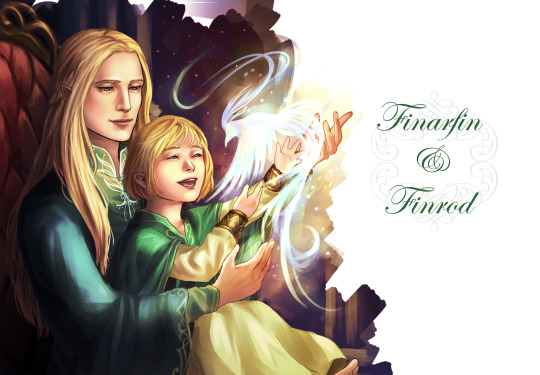
Fathers with Their Firsborn
hmm maybe i should upload this in Father’s Day, but nevermind, already draw this now and also tomorrow is Children’s Day. Happy Children’s Day 20 November 2013! :D
too lazy to detailed the fabric and design.. and i dont really like the color, again it too yellow, wish this dont hurt your eyes >.<
3K notes
·
View notes
Text
We wanted to post up a little WE’RE NOT DEAD post.
Lairë, due to an autoimmune disorder she has that is treated with immunosuppressants, contracted pneumonia quickly and badly. It’s taken a month of doctors’ visits, antibiotics, and steroids, but she’s starting to feel more like herself. We’re hoping to resume the podcast in the next two weeks. :)
5 notes
·
View notes
Text
Working on the research for Episode 8 today. Episode 8 was originally going to be about Dwarves, but we've switched it up a little. Episode 9 will be about Dwarves, but this week's episode will actually center around Orcs. :)
1 note
·
View note